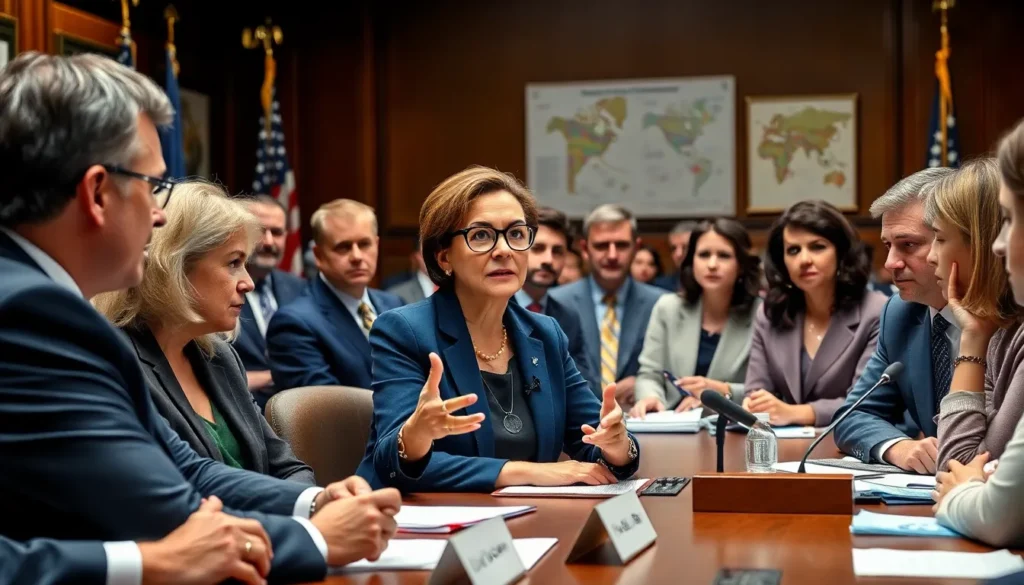Table of Contents
ToggleIn a world where technology evolves faster than a cat meme goes viral, the Science, Space, and Technology Committee is the unsung hero navigating the cosmic chaos. This committee isn’t just a bunch of lab coats and rocket scientists; they’re the masterminds behind groundbreaking innovations that keep society buzzing. From exploring the mysteries of the universe to ensuring that our gadgets don’t turn us into couch potatoes, their work is crucial.
Overview of the Science Space and Technology Committee
The Science, Space, and Technology Committee plays a pivotal role in shaping policies that influence scientific research and technological advancements. Focused on a wide array of topics, the committee addresses issues ranging from space exploration to computer science. Members include a diverse group of experts, ensuring a broad perspective on various scientific disciplines.
The committee’s primary responsibilities include overseeing federal research initiatives. These initiatives involve funding for projects aimed at promoting innovation. Collaboration with other governmental agencies strengthens the committee’s efforts to tackle complex challenges. Each year, the committee reviews numerous proposals, critically assessing their potential impact on society and the economy.
Furthermore, public engagement remains a key component of the committee’s mission. By organizing hearings, the committee fosters discussions between scientists, engineers, and policymakers. These sessions aim to bridge the gap between technical information and public understanding. Promoting education in STEM fields also stands at the forefront of the committee’s agenda. Enhanced educational programs contribute to inspiring future generations of scientists and innovators.
The committee actively participates in legislative processes, proposing laws that prioritize scientific integrity and technological growth. Regular reports provide transparency about the committee’s activities and the outcomes of funded research projects. A detailed focus on issues like climate change, national security, and healthcare technology highlights the committee’s broad scope. Through these efforts, the Science, Space, and Technology Committee ensures a proactive approach to fostering a scientifically informed society.
History and Formation

The Science, Space, and Technology Committee traces its roots back to the establishment of the U.S. House of Representatives in 1958. Formed as a response to the growing complexity of scientific and technological issues, this committee has continually evolved to address emerging challenges and opportunities.
Founding Members
Prominent figures among the founding members included scientists and policymakers who recognized the need for a dedicated body to oversee scientific advancement. Their collective expertise spanned multiple disciplines, ranging from aeronautics to life sciences. These early leaders set the foundation for a committee focused on innovation and public welfare, emphasizing the importance of federal support for research initiatives.
Key Milestones
Several key milestones mark the committee’s journey. In 1975, it played a crucial role in the establishment of NASA’s Space Shuttle program, significantly advancing human space exploration. The committee also supported the passage of the National Science Foundation (NSF) Act in 1950, paving the way for federal investment in scientific research. Over the years, its focus has expanded, addressing contemporary issues such as climate change and cybersecurity, further solidifying its impact on national policy.
Roles and Responsibilities
The Science, Space, and Technology Committee plays crucial roles in shaping the landscape of science and technology through various responsibilities.
Oversight Functions
Oversight functions include monitoring federal research initiatives. The committee ensures that projects align with national priorities and taxpayer interests. Regular assessments of effectiveness inform funding decisions. Members engage with various stakeholders, allowing for incoming feedback. Transparency is emphasized through public reports, which detail project outcomes. These actions help the committee maintain accountability in scientific efforts.
Legislative Duties
Legislative duties focus on crafting policies that support scientific and technological advancement. Members propose bills designed to enhance research funding and promote innovation. Collaboration with other legislative bodies ensures comprehensive discussion on critical issues. Regular hearings gather expert testimonies, enriching the lawmaking process. The committee also prioritizes laws that uphold scientific integrity and community engagement. Through these efforts, the committee plays a pivotal role in influencing national science and technology direction.
Recent Initiatives
The Science, Space, and Technology Committee continually undertakes initiatives that shape the future of science and technology. Recent projects and policy impacts highlight the committee’s commitment to innovation and public engagement.
Notable Projects
The committee reported significant advancements in various projects. Space exploration initiatives like the Artemis program showcase efforts to return humans to the Moon while paving the way for Mars missions. Investments in artificial intelligence research focus on enhancing national security and improving public services. Collaborative programs with universities promote STEM education and foster a new generation of innovators. Efforts in climate research address pressing environmental challenges. These projects reflect the committee’s dedication to addressing complex scientific problems.
Impact on Policy
The committee significantly influences federal policy through its legislative initiatives. Regular hearings allow experts to share insights on emerging technologies, ensuring informed decision-making. Legislative proposals prioritize funding for scientific research, emphasizing climate change and cybersecurity. Policies aimed at enhancing scientific integrity promote transparency and public trust. Engaging with community stakeholders facilitates collaboration, further enriching the policy development process. Ultimately, the committee’s efforts aim to create a scientifically informed society that values technological growth.
Challenges and Controversies
The Science, Space, and Technology Committee faces numerous challenges and controversies as it navigates complex political and public landscapes.
Political Dynamics
Political dynamics significantly influence the committee’s effectiveness. Diverse opinions among members often lead to debates on funding priorities and scientific agendas. Partisan disagreements can delay crucial legislation and hinder funding for innovative projects. Members advocate for different sectors of science, creating a tug-of-war for resources. As technology rapidly evolves, aligning policy with scientific progress remains challenging. Navigating these waters requires strong collaboration and mutual understanding among committee members and stakeholders. Recent events, such as renewed interest in space initiatives, showcase the necessity of maintaining bipartisan support for sustainable growth.
Public Perception
Public perception shapes the committee’s objectives and initiatives. Misinformation about scientific topics can lead to skepticism regarding the committee’s work. Engaging with the community becomes essential to build trust and enhance understanding. Outreach efforts aim to educate the public about scientific advancements and their implications. Perceptions about funding allocations can create controversy, especially when prioritizing certain fields over others. Addressing these concerns requires transparency and effective communication strategies. As a result, the committee emphasizes enhancing public discourse surrounding science and technology, reinforcing its commitment to a scientifically informed society.
The Science, Space, and Technology Committee stands at the forefront of innovation and policy-making. By bridging the gap between scientific research and public understanding, it plays a crucial role in shaping a future that values technological advancement. Its commitment to transparency and public engagement fosters trust and encourages informed discussions around complex scientific issues.
As the committee navigates political landscapes and addresses emerging challenges, its dedication to STEM education and collaboration remains steadfast. The ongoing efforts to enhance funding for vital research areas ensure that the nation can tackle pressing concerns like climate change and cybersecurity. Ultimately, the committee’s work is essential in creating a scientifically literate society prepared to embrace the possibilities of tomorrow.




